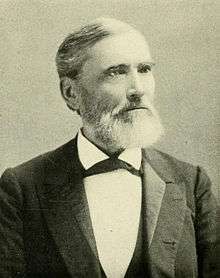David Turpie
David Battle Turpie (July 8, 1828 – April 21, 1909) was an American politician who served as a Senator from Indiana from 1887 until 1899; he also served as Chairman of the Senate Democratic Caucus from 1898 to 1899 during the last year of his tenure in the Senate.
David Turpie | |
|---|---|
 | |
| Chairman of the Senate Democratic Caucus | |
| In office April 1898 – 1899 | |
| Preceded by | Arthur Pue Gorman |
| Succeeded by | James Kimbrough Jones |
| United States Senator from Indiana | |
| In office March 4, 1887 – March 4, 1899 | |
| Preceded by | Benjamin Harrison |
| Succeeded by | Albert J. Beveridge |
| United States Senator from Indiana | |
| In office January 14, 1863 – March 3, 1863 | |
| Preceded by | Joseph A. Wright |
| Succeeded by | Thomas A. Hendricks |
| Personal details | |
| Born | David Battle Turpie July 8, 1828 Hamilton County, Ohio, U.S. |
| Died | April 21, 1909 (aged 80) Indianapolis, Indiana, U.S. |
| Political party | Democratic |
| Education | Kenyon College (BA) |
Turpie was born in Hamilton County, Ohio. He grew up in Ohio and graduated from Kenyon College in 1848. He studied law and moved to Logansport, Indiana where he set up a law practice. He soon became active in the United States Democratic Party to which he would belong for the rest of his life.
Turpie was elected to the state legislature at the age of 24 in 1852. He served one term and then returned to practicing law. In 1854 he became a common pleas judge and in 1856 he became a state circuit court judge. In 1858 he was elected to the state legislature again for one year.
He was the Democratic candidate for the U.S. House seat held by Schuyler Colfax in 1862, losing only narrowly.[1] Shortly thereafter, Turpie was elected to the United States Senate from Indiana in January 1863, to fill the unexpired term of Jesse D. Bright who had been expelled for alleged disloyalty. The term was nearly complete, however, so Turpie only served in the Senate for one month. He returned to practicing law.
Turpie moved to Indianapolis, Indiana in 1872. He was again elected to the state legislature and served as speaker of the Assembly from 1874 to 1875. He served as the United States District Attorney for Indiana from 1886 to 1887.
In 1887, Turpie was again elected to the United States Senate from Indiana, this time for a full term. He defeated Benjamin Harrison who would soon become the President of the United States. His return to the U.S. Senate, after 24 years and 1 day out of office, marks the third longest gap in service to the chamber in history.[2] Turpie was reelected in 1893 and served in the Senate for 12 years, from 1887 to 1899. As a senator, he served as chairman of the Committee on the Census from 1893 to 1895, chairman of the Democratic Conference from 1898 to 1899, and supported a plebiscite on annexation for the people of Hawaii rather than forced annexation. Turpie was defeated for reelection by Albert J. Beveridge. He retired from public life and died in Indianapolis.
References
- "Schuyler Colfax, 17th Vice President (1869-1873)". Secretary of the Senate, Washington, D.C. Retrieved April 5, 2019.
- Ostermeier, Eric (December 4, 2013). "Bob Smith and the 12-Year Itch". Smart Politics.
Sources
- United States Congress. "David Turpie (id: T000432)". Biographical Directory of the United States Congress.
External Links
- David Turpie collection, Rare Books and Manuscripts, Indiana State Library
| U.S. Senate | ||
|---|---|---|
| Preceded by Joseph A. Wright |
U.S. Senator (Class 1) from Indiana 1863 Served alongside: Henry Lane |
Succeeded by Thomas A. Hendricks |
| Preceded by Benjamin Harrison |
U.S. Senator (Class 1) from Indiana 1887–1899 Served alongside: Daniel W. Voorhees, Charles W. Fairbanks |
Succeeded by Albert J. Beveridge |
| Preceded by Eugene Hale |
Chair of the Senate Census Committee 1893–1895 |
Succeeded by William E. Chandler |
| Party political offices | ||
| Preceded by Arthur Pue Gorman |
Chair of the Senate Democratic Caucus 1898–1899 |
Succeeded by James Kimbrough Jones |
